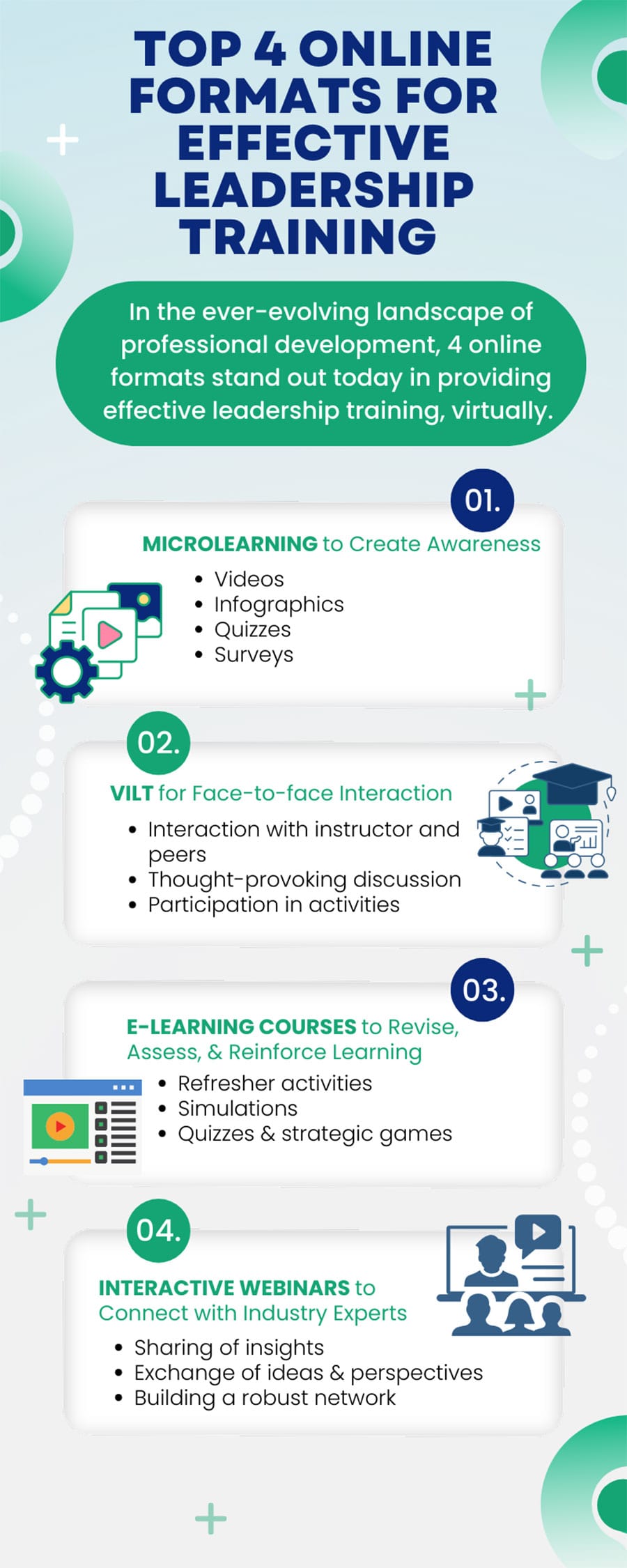Top 4 Online Formats for Effective Leadership Training [Infographic]
Leadership training plays an important role in ensuring an organization’s success. Learn about top online formats to ensure high-impact training.

Imagine a mighty river flowing through a dense forest, carving its path with determination and purpose, much like creating a way and leading many along the way to their destiny. Well, this parallelism reminds me of a leader. Much like the river, a great leader too navigates obstacles, inspires change, shapes, and beautifies the landscape around it.
Owing to these characteristics, the demand for effective leadership in the business world is integral. It helps prepare leaders who are capable of steering their teams through turbulent waters of change effectively and confidently. This is just one of the many reasons that highlight the necessity of leadership training in corporate. In this blog, we will cover in detail the need for leadership training and also learn about the different online formats that not only meet this demand but go beyond by facilitating an engaging and immersive learning experience.
So without any delay, let's begin.
The Need for Leadership Training
Fosters Adaptability to Change
As the business landscape is constantly changing, it is crucial for the leaders to possess the skills and know-how to adapt to change swiftly and strategically. Afterall, it is not just them alone, their attitude toward change heavily impacts their team and organization as well. Leadership training prepares employees with the relevant plans, strategies, processes, and tools that help tackle change as an opportunity for growth and innovation.
→ Download Now: Instructional Design Strategies for Engaging eLearning Courses
Builds Strong Team Dynamics
A leader is only as strong as the team they lead. So leadership training emphasizes the importance of fostering a positive and collaborative team culture. It enables leaders to learn to identify and leverage the strengths of team members, creating a harmonious and high-performing work environment.
Enhancing Communication Skills
“Leadership is a way of thinking, a way of acting and, most importantly, a way of communicating.”
These words by Simon Sinek emphasize the importance of effective communication in successful leadership. Today’s world is saturated with information, therefore, leaders must learn to communicate with clarity, empathy, and influence. Offering them with leadership training programs that refine communication skills is certain to garner attention and maintain learner engagement. It will enable the leaders to share and execute their knowledge and ideas effectively.
Enables Challenges and Conflict Resolution
Challenges and conflicts are inevitable in any workplace. But with leadership training, you can ensure that your leaders are able to navigate through these obstacles efficiently. With relevant approach, they can address conflicts tactfully, maintaining harmony within team that leads to productivity and growth.
Promotes Strategic Decision-Making
Leaders often find themselves at a crossroads where strategic decisions can make or break a business. So providing them with leadership training that focuses on honing different skills like decision-making, critical thinking, time management, emotional intelligence, etc., can be useful. These skills help them analyze situations, weigh options, and make informed choices that align with the goals of both their team and organization.
Formats for Effective Leadership Training
Wrapping It Up!
Effective leadership training is the compass that guides individuals through the ever-changing landscape of business. By understanding the key role of leadership training in ensuring successful business outcomes and leveraging the diverse formats for leadership training, you are all set to win. So pick a format that aligns with your training and business goals and give your leaders an opportunity they deserve! To leave no stone unturned, check out the instructional design strategies given in our free eBook to design engaging, learner-centric training courses.







